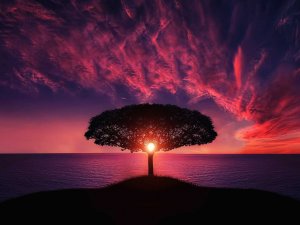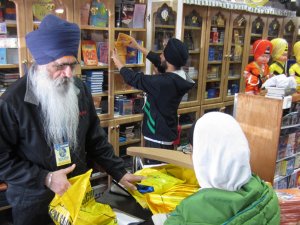Lest the title be a turn off, I assure you any reference to Trump in the White House will be so brief that you will likely miss it.
Gurduara politics that often sicken us will come in, but somewhat tangentially.
There was a time when there were so few Sikh faces on the streets in America that we pined for one. There never was talk about disciplinary issues or political shenanigans in or about gurduaras; there really were too few to kvetch about.
Things have changed and how! There are over 250 gurduaras in the country and at least 20 within my commuting distance. Years ago, we closed our eyes in the face of likely corruption in gurduara management. Now the many possibilities remind us that sometimes ignorance is bliss.
Quite expectedly, our attitudes have changed. The current refrain in the sangat often goes “We have a peaceful sangat. We allow no politics within the gurduara. We go regularly for the katha, keertan, and langar This triad makes a heavenly abode. Nothing could be better.”
In the gurduara that I often attend, there a is moratorium on any speeches, unless it is someone from the Managing Committee. Sometimes I think this reduces the sangat to what I would uncharitably label “driven-cattle,” not a holy sangat. If the sangat does not talk about management – needs and efforts – it seems that the path is less inclusive and more regressive. My counterpoint is that absence of open hostilities is not peace. Peace is a state of mind. To me this is fake peace, the deceptive solitude of the cemetery.
I have visited or heard from perhaps 90 percent of the gurduaras in this country and they all finger the same villain – human ego, in the management. What follows indubitably then are a few lines from Guru Granth condemning human ego and we quickly return to the status quo. And those who restrict speeches in gurduaras smugly articulate the virtue of their ways, often with a beatific smile.
And I wonder:
True that we need not replicate Trump’s talents or eccentricities in gurduaras but what exactly do we mean by politics in gurduaras?
Look at a happily married couple. Do they ever disagree? That would be questioning the obvious. Surely, they disagree, at times even aggressively and brusquely. Same about larger units like close families. Watch little children at play; they are no different. When the functioning unit is larger than a family it becomes a community. Do they ever disagree? We know the answer. People who love each other and will die for each other, can also kill each other, and will likely disagree on matters trivial or critical. So why should they never disagree in gurduaras? Yes, disagree, but do so without becoming disagreeable.
Sociologists tell us that religion, arguably, is the glue that unites a people. Be not afraid of differences. Remember that without differences of opinion there is no progress possible. A sense of some discontent with what exists is necessary to drive new ideas and improvement.
In a lifetime in academia – teaching and research – I must have told a zillion students that when you listen to a lecture it should leave you somewhat uncomfortable. If not, then you might just as well have slept through it. If you read a research report, your thoughts should go to questions that need further exploration and answers. That’s the only way to progress.
One-upmanship, too, is in the human DNA and it is universal. It is through differences that individuals continue to self-test their own abilities and capabilities, and how they are perceived by others in, and outside, the community. This state of mind is fundamental to our sense of self and our place in the community and society. The only way to negate this would be to reject the world and make our home in an isolated cave or mountain peak. Even this remedy is only a figment of our imagination and has no life in reality. It is not the solution.
When we differ in speech and/or action are we then creating the bugaboo of the derided word – politics?
Come for a moment with me, and step into the vast treasury of the Guru Granth. Guru Nanak dismisses kings as being like tigers and dogs (Rajey seeh mukaddam kuttay, p.1288); further he opines that Babur who had invaded India at that time had metaphorically brought a marriage party of evil and sin, and was now violently demanding a dowry (Paap ki junj lae Kablo dhaaya jori mangae daan ve Laalo, p. 722). Do these read like non-political statements at any time anywhere? Or when Guru Nanak emphatically challenged us on the second-class status of women by asking why should we diminish women who give birth to every one including kings (So kyo manda aakhiyae jit jamaen rajaan ….. p. 473. I cited only one line here; I assure you the whole hymn is magically powerful.)
Remember also that today the position of women at work and home as equal partners with men in society is the defining pivotal issue in progressive societies. Remember that it was only in 1920 that women in America got the right to vote.
Are these not political issues that are consistent with daily worship in gurduaras? Many verses in the Guru Granth speak of war and peace, inequality, justice, human rights, and condemn the vice of caste that is still so prevalent in Indian society. If these are of no concern to modern politics in sane societies, I don’t know what else would be.
Clearly, in rubbishing free speech and opening the community center (gurduara) to people and their differences we are diminishing our goals and abilities. Also true that speech needs the well-constructed guard rails of essential grace and politeness. But diatribes about the evil of politics in gurduaras destroy only “low hanging fruit.” And that is counterproductive.
Banning speech is not a solution; it’s appropriate only in the context of time and place. Given these constraints, the essence of free speech is a prerequisite to peace and progress. We need to value free speech and community involvement both inside and outside the gurduara Yet, we always need to know which issues are best addressed, also when, how and in what setting. Closing our eyes to politics whether in family, community, society, gurduara, or the world around us is not progressive.
In life can we ever construct a politics-free zone? I surely hope not! I would bet that it is not possible.





